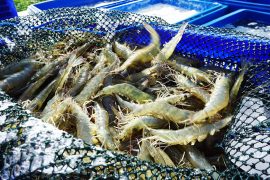
10,000% pollution increase from offshore oil and gas platforms decimates ocean life
A recent study has shown that North Sea oil and gas extraction can lead to a dramatic increase in pollution levels, with contaminants like hydrocarbons rising by more than 10,000% within half a kilometer of offshore platforms.
The collaborative research, conducted by the University of Essex, the Natural History Museum, and the Center for Environment, Fisheries, and Aquaculture Science (CEFAS), found a significant decline in the number of species around offshore platforms, with biodiversity dropping nearly 30 percent.
This new data provides a clearer picture of the environmental impact of fossil fuel extraction, particularly on Britain’s seabed life.
Pollution near offshore platforms
The research, published in the journal Science of The Total Environment, focused on pollutants such as hydrocarbons and heavy metals, including lead, copper, and nickel.
The findings revealed that hydrocarbon levels were up to 10,613% higher and heavy metal concentrations were 455% higher within 500 meters of the platforms compared to areas further away.
The study highlights how these pollutants accumulate around platforms, significantly affecting marine invertebrates, which are crucial for underwater ecosystems as they serve as prey for larger animals like fish.
Biodiversity loss from oil and gas production
Zelin Chen, a PhD student who led the research, explained the extensive impact of hydrocarbon extraction on biodiversity.
“We’ve known for a while that hydrocarbon extraction can impact biodiversity, but this is the first-time consistent trends have been found across several platforms,” said Chen.
“There were clear changes in community diversity and composition, with a general decrease in the number and type of species near the platforms after oil and gas production began.”
Food webs near offshore platforms
The study authors analyzed data for 4,216 species collected from 1981 to 2012 at nine oil and gas platforms off the coasts of Scotland and England.
The results showed a reduction in species richness and a simplification of food webs within 500 meters of the platforms.
These food webs, which describe the feeding interactions among species, became simpler and smaller in the impacted sediments.
Large predators like starfish were notably absent near the platforms, while smaller organisms like worms thrived in the contaminated environment.
Significant declines in species richness
The experts used chemical data to define an impact zone within 500m of a platform, a buffer zone within 500-1500m, as well as unimpacted areas beyond that.
This approach allowed the team to compare biological samples from different zones taken before and after oil and gas production commenced.
The findings showed a significant 28% decline in species richness in the impacted sites and fewer connections within the food webs closer to the platforms.
Significance of the study
The implications of these findings are concerning, especially as many of these platforms are approaching the end of their operational life.
“This is important because simpler food webs with shorter food chains are highly indicative of less productive areas under environmental stress,” said Eoin O’Gorman from the University of Essex, emphasizing the environmental significance of the study’s findings.
Dr. Natalie Hicks, also from Essex, stressed the need for careful decommissioning of these platforms. She said they are leaving a potentially concerning legacy, particularly as many are reaching the end of life.
“Many of these sites will be decommissioned in the coming decade and we need to collaborate closely with industry and the Government to ensure decommissioning practice is led by science and done safely,” said Dr. Hicks.
Long-term impacts of offshore platforms
The study underscores the critical need for informed decommissioning practices to mitigate the potential long-term environmental impacts of these offshore platforms.
“Our collaborative study between the NHM, University of Essex, and CEFAS, which spans 30 years of field data, demonstrates that oil and gas operations simplify complex ocean ecosystems, favoring small, hardy species and causing the disappearance of more delicate marine life,” said Gareth Thomas, a scientist at the Natural History Museum.
Broader implications of the study
As the world continues to explore and extract fossil fuels, this study provides essential insights into the environmental costs of such activities.
The researchers call for further investigation and more sustainable practices to protect marine ecosystems, especially as the decommissioning of many North Sea platforms looms on the horizon.
The study’s findings serve as a reminder of the urgent need for a comprehensive approach to ocean conservation, balancing resource extraction with the preservation of marine biodiversity.
—–
Like what you read? Subscribe to our newsletter for engaging articles, exclusive content, and the latest updates.
Check us out on EarthSnap, a free app brought to you by Eric Ralls and Earth.com.
—–













